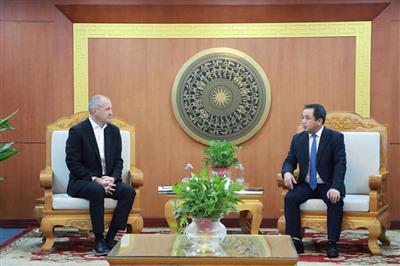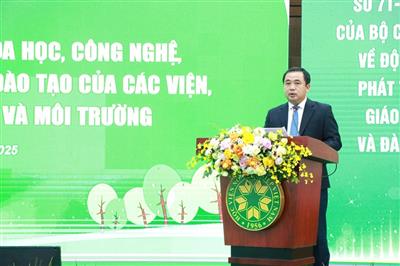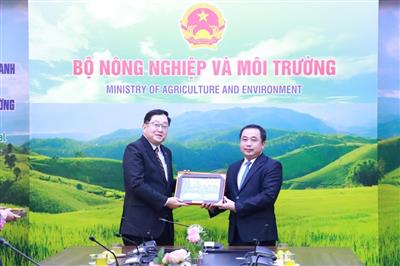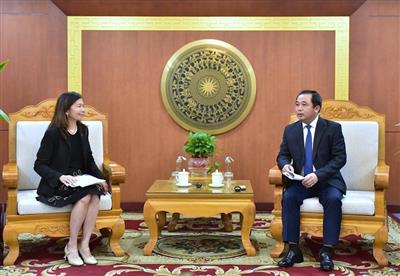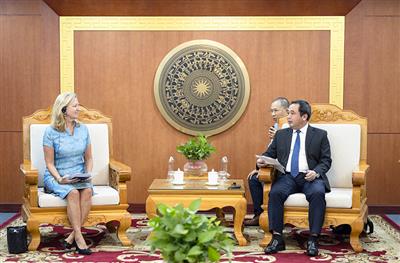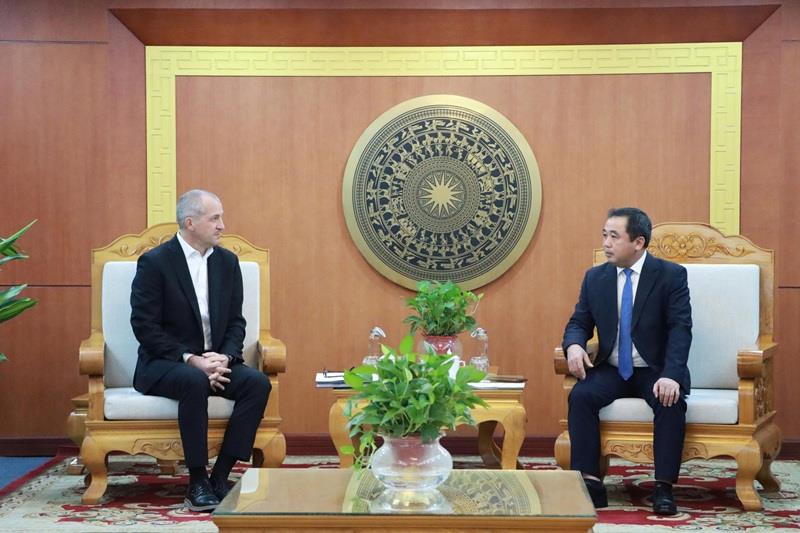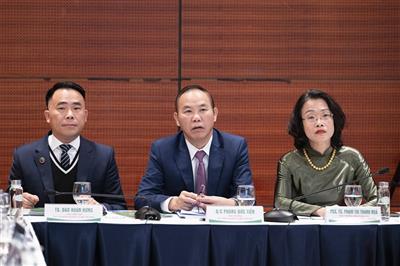
Vietnam's journey to plastic reduction: Global impact and local actions - Part 2: Communication of plastic reduction practices to businesses, organizations, and local communities
18/02/2025TN&MTOne of the key objectives of the “Mitigating marine plastic debris in Vietnam” project is to promote behavioral and awareness changes regarding plastic use in order to protect the environment and preserve the blue ocean. These efforts target individuals, organizations, and coastal communities. As a result, the communication activities conducted by WWF-Vietnam and the Vietnam Agency of Seas and Islands (VASI under the Ministry of Natural Resources and Environment) are tailored to specific groups, including businesses, commercial establishments, schools, and coastal community residents.
Plastic reduction practices in businesses and retail establishments
At supermarkets and retail outlets, the “Mitigating marine plastic debris in Vietnam” project has collaborated to organize the "Thousand years of plastic waste" campaign at Big C Thang Long Mall and Lotte supermarket in Hanoi. In addition, the project has implemented various activities aimed at supporting and partnering with the Retailers' Alliance to reduce plastic bags and single-use plastic products. These activities promote environmental protection through practical actions. The alliance members are committed to reducing plastic bags and single-use plastics by replacing non-biodegradable bags with eco-friendly alternatives, conducting awareness campaigns about the harmful effects of plastic waste, and organizing "Plastic-free days" once a month. This initiative, the first of its kind, unites retailers in collective efforts to reduce single-use plastic and find immediate and feasible solutions to tackle the issue.
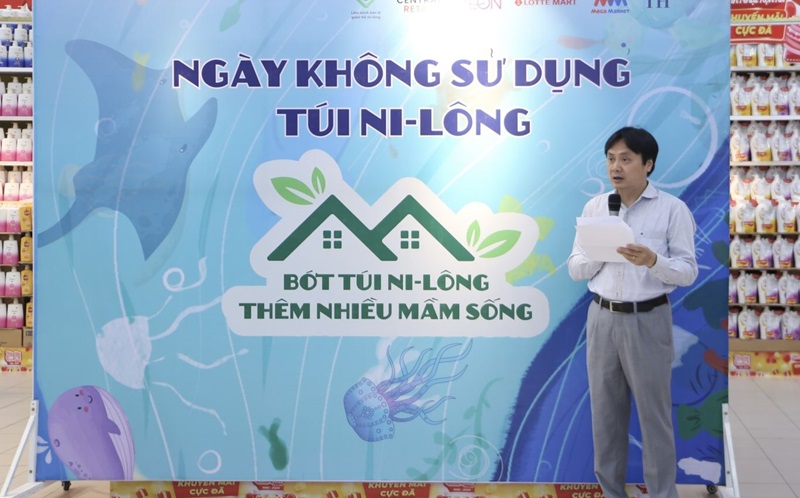
Mr. Nguyen Trung Thang, Deputy Director of the Institute of Strategy and Policy on Natural Resources and Environment, delivers a speech at the campaign "Vietnam's national plastic bag-free day"
In addition, the project collaborated with the Institute of Strategy and Policy on Natural Resources and Environment (ISPONRE) and the Hanoi Department of Industry and Trade to organize Vietnam's national plastic bag-free day. Members of the Retailers’ Alliance, including TH true mart, Central Retail, MM Mega Market Vietnam, AEON Vietnam, and LOTTE Mart Vietnam, encouraged customers to avoid using plastic bags and conducted awareness activities highlighting the harmful impacts of plastic waste.
The project also hosted a workshop in collaboration with the Institute of Strategy and Policy on Natural Resources and Environment to share the results and experiences of reducing plastic bag use in supermarkets and retail outlets. Notable outcomes of the "Plastic-free Day" include the participation of 16 entities, resulting in the reduction of 40,000 plastic bags, equivalent to 200kg of plastic waste, and over 10,000 social media interactions. Following the event, several retailers committed to continuing efforts to reduce plastic bag use, with the goal of using 100% environmentally-friendly packaging by 2025. For instance, TOPS Markets in Hanoi, Ho Chi Minh City, Hai Phong, and Can Tho will continue the "Plastic-Free Day" every Wednesday, while AEON Vietnam will carry out this event on the first Monday of every month at its supermarkets in Tan Phu and Long Bien.
In the food service and hospitality sectors, the project has engaged 15 businesses in Hanoi, raising awareness about their plastic use and waste management practices. Notably, there has been a clear increase in demand for eco-friendly packaging following the campaign. The project's recommendations on plastic waste reduction align closely with the businesses’ goals and expectations.
Promoting plastic reduction in schools
Building on the success of the "Ocean plastic waste management course for university students," the project has successfully integrated ocean plastic waste topics into the curriculum at Hanoi National University and Hue University. Ocean plastic waste content has been incorporated into mandatory and elective courses at both universities, equipping thousands of students with knowledge about marine plastic waste management and encouraging behavioral changes in plastic usage.
The project has also disseminated updated information on ocean plastic waste to students. At Hue University, the project developed and implemented a dedicated chapter on marine plastic waste for the “Integrated coastal zone management” course for environmental science students. Additionally, content on marine plastic waste was incorporated into the “General environmental education” curriculum for non-environmental majors across the university’s member institutions. At Vietnam National University, Hanoi, marine plastic waste management has been included in three undergraduate courses—Administrative Law, International Public Law, and International Environmental Law—at the VNU School of Law. The university also hosted a symposium on teaching marine plastic waste management, attended by 30 lecturers from VNU School of Law, Diplomatic Academy of Vietnam, and Hanoi University of Home Affairs.
Through these initiatives, 4,015 students from 44 schools across eight provinces and cities (Hue, Da Nang, Quang Binh, Ha Tinh, Long An, Kien Giang, Phu Yen, Vung Tau) have actively participated in extracurricular programs and awareness-raising activities focused on reducing plastic waste in schools. The program has successfully met its objectives.
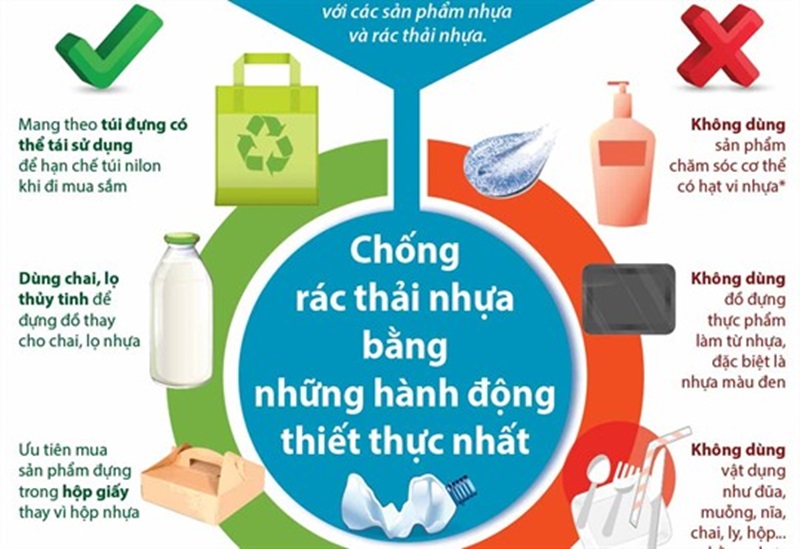
The project has successfully integrated ocean plastic waste topics into the curriculum at Hanoi National University and Hue University
A long-term roadmap has also been developed for teachers and students, featuring activities such as teacher training workshops on plastic waste reduction planning, student-led waste audits and classification, and the installation of waste-sorting bins in schools. Additionally, creative educational tools, such as the storybook "The mystery of the big island'', have been introduced into school libraries, accompanied by storytelling sessions and interactive discussions. Schools have also hosted student-led interactive plays, creative exhibitions, and dynamic games focused on plastic waste reduction. Initiatives like the "Gen Z Da Nang: Acting for a blue sea" competition have encouraged students to propose scientific solutions for reducing plastic waste in daily life. Despite challenges in human resources for extensive outreach, the project has garnered strong support from local authorities, schools, and students, driving impactful action towards plastic waste reduction.
Supporting coastal communities in plastic reduction efforts
In Dong Hoi (Quang Binh), the "Plastic bag reduction" pilot project was launched at Dong Hoi Market under the Women’s Union of Dong Hoi City. The initiative includes a range of impactful activities: (1) raising awareness and promoting responsible action among Women’s Union members, particularly female vendors, to minimize plastic bag use and support urban sustainability; (2) implementing a pilot program at Dong Hoi market to encourage both vendors and customers to reduce their reliance on single-use plastic bags; (3) educating market vendors, residents, and tourists about the harmful effects of excessive plastic bag consumption on the environment; and (4) fostering leadership and solidarity within the Women’s Union to mobilize members in support of sustainable practices. These activities are tailored to local conditions, ensuring practical and effective implementation.
In Phu Yen, as part of efforts to enhance the capacity of local Women’s Union branches for community-based communication campaigns, the project has provided resources to support the Women’s Union of Son Hoa District. Specifically, the "Civilized – Green – Clean – Beautiful environment" chapter was established in Phu Huu hamlet, Suoi Bac commune, with 50 members. All members adopted household waste sorting practices and built backyard compost pits measuring 60 to 100 cm deep and wide, depending on available space, with wooden or metal covers. Additionally, many members planted trees and flowers around their homes and actively participated in maintaining cleanliness along residential roads and public spaces.
Awareness workshops on plastic waste pollution and household waste sorting were also held in Suoi Bac commune and Son Hoa district, helping to promote sustainable habits within the community.
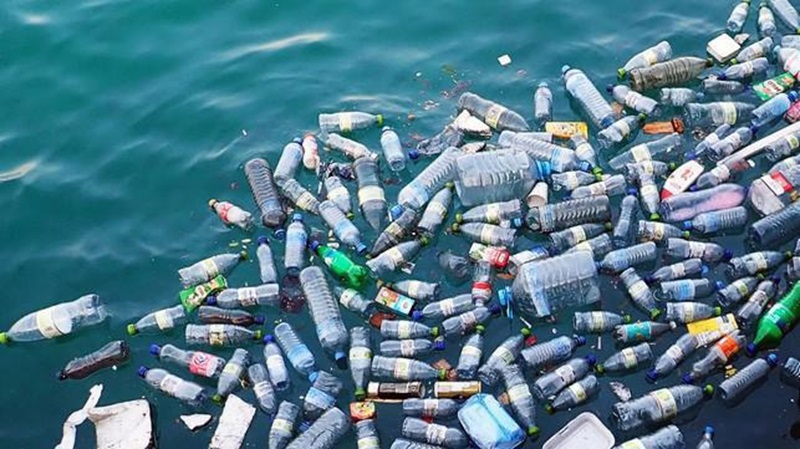
In Phu Quoc, the project collaborated with the Phu Quoc Youth Union to organize a “Film camp – Visual storytelling” workshop, equipping 60 youth union members and teachers from three local high schools with media skills
In Phu Quoc, the project collaborated with the Phu Quoc Youth Union to organize a “Film camp – Visual storytelling” workshop, equipping 60 youth union members and teachers from three local high schools with media skills. By the end of the training, nine short films were produced, creatively conveying powerful messages about plastic reduction.
Participants gained valuable insights into the plastic waste crisis in Phu Quoc and its environmental consequences. The workshop provided them with hands-on skills in visual storytelling, enabling them to document and share plastic reduction initiatives and highlight youth-led environmental efforts in schools. The training also covered image and video editing techniques for effective communication campaigns.
Additionally, the project supported the Phu Quoc Literature and Arts association in launching a photography competition on plastic pollution. Designed to enhance public awareness, the contest received nearly 50 submissions in a short period. The selected photographs were exhibited in high-traffic areas to engage both locals and tourists in the movement to preserve Phu Quoc as a “Plastic-free pearl island”.
In Ha Tinh, the project partnered with the Ha Tinh Youth Union to conduct a "Visual sorytelling" training for high school youth union members. The workshop equipped participants with skills to create short films on plastic reduction and use visual media for awareness campaigns.
Through these video projects, the initiative aims to enhance youth engagement in plastic waste reduction, foster responsibility among youth organizations, and cultivate an environmentally conscious mindset.
Hong Minh


